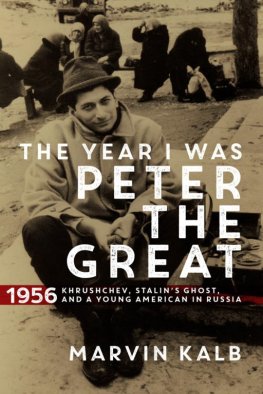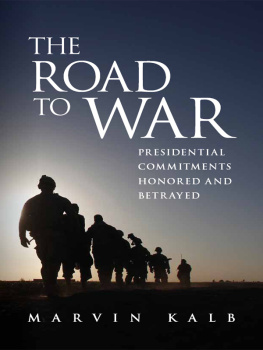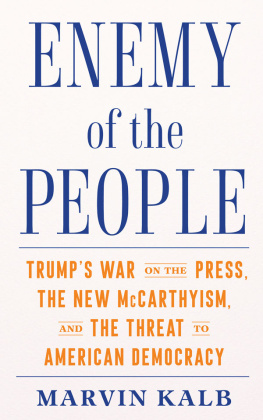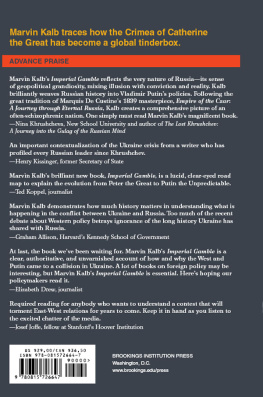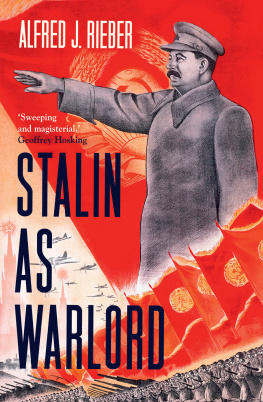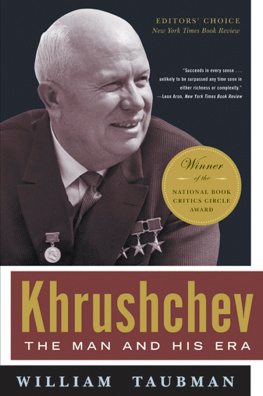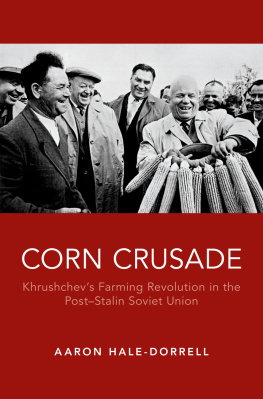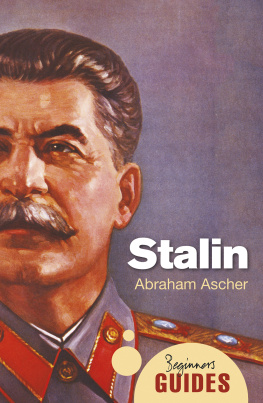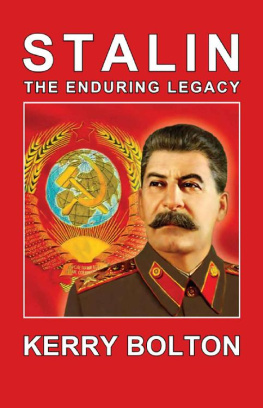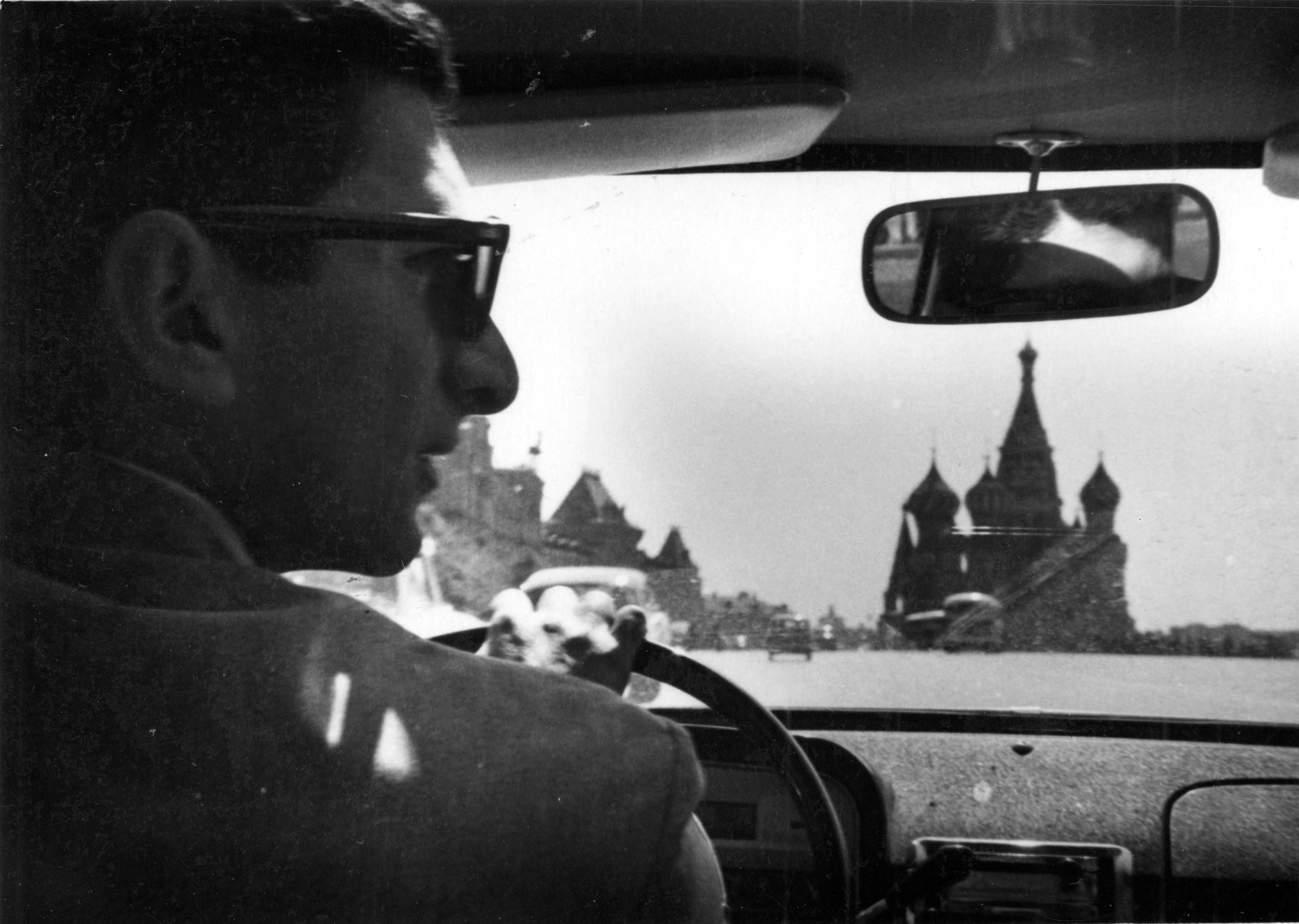
The author driving near St. Basils Cathedral in Red Square.
THE YEAR I WAS PETER THE GREAT
1956KHRUSHCHEV, STALINS GHOST, AND A YOUNG AMERICAN IN RUSSIA
MARVIN KALB
BROOKINGS INSTITUTION PRESS
Washington, D.C.
Copyright 2017
THE BROOKINGS INSTITUTION
1775 Massachusetts Avenue, N.W., Washington, D.C. 20036
www.brookings.edu
All rights reserved. No part of this publication may be reproduced or transmitted in any form or by any means without permission in writing from the Brookings Institution Press.
The Brookings Institution is a private nonprofit organization devoted to research, education, and publication on important issues of domestic and foreign policy. Its principal purpose is to bring the highest quality independent research and analysis to bear on current and emerging policy problems. Interpretations or conclusions in Brookings publications should be understood to be solely those of the authors.
Library of Congress Cataloging-in-Publication data are available.
ISBN 978-0-8157-3161-0 (cloth : alk. paper)
ISBN 978-0-8157-3162-7 (ebook)
9 8 7 6 5 4 3 2 1
Typeset in Albertina MT
Composition by Westchester Publishing Services
To the young journalist on a first assignment,
whether to Moscow or City Hall:
just tell us whats happening, without fear or favor.
Contents
Preface
Write a memoir, Marvin!
The advice would come from family and friends, at first gently but then, after a while, with growing insistence. Youve broadcast from everywhere. Youve written books about Russia, China, Egypt and Israel, the Vietnam War, and Ukraine. Youve lectured on presidents from Truman to Trump. And at dinners and classrooms, youve told fascinating personal stories about your coverage of the Cold War. And, then, with a knowing nod, theyd add, Its time for a memoir.
Until recently I had resisted. Journalists, I would argue, do not write memoirs; they write the first draft of history, the stories they cover. At their best, they are observers of history. They cover major events, such as presidential campaigns, wars, summits, legislative battles on Capitol Hill. They interview presidents, senators, secretaries of state. But they are not actors in a story, or shouldnt be; they stand on the sidelines, or should, always attempting with an air of detachment to be fair and objective. Only then do they add their analysis, opinion, and perspective. They are the scribes of our time.
But over the years, when the advice to write a memoir began to come from my twelve-year-old grandson, Aaron, and my nine-year-old granddaughter, Eloise, who, separately or together, knew instinctively how to get to their eighty-seven-year-old Grampa, I felt myself folding under their gentle pressure. But I did attach a caveat. I would not write a purely personal memoir, reminiscences of the ups and downs of family and friends. My private life was, after all, private. I would write a more professional memoir, focusing on my coverage of the major moments of the Cold War, of the leaders I met and the decisions they made.
For example, in 1956 I met the Soviet leader Nikita Khrushchev, who in jocular exchanges would often refer to me as Peter the Great. But he was also the Russian autocrat who brought the world to the brink of a nuclear war during the Cuban Missile Crisis. I had serious differences with Presidents Johnson and Nixon. The issue was almost always Vietnam. They objected strenuously to my coverage of the war. Nixon wiretapped my home phone and put me on his enemies list. I enjoyed memorable conversations with three Israeli prime ministersGolda Meir, Yitzhak Rabin, and Menachem Begin. I learned a lot about the Arab world during Henry Kissingers groundbreaking shuttle diplomacy in the early 1970s, when I often met Jordans King Hussein and Egypts courageous Anwar Sadat. I reported on the Kremlins suspected involvement in the assassination attempt on Pope John Paul II. And in the early 1990s I wrote about the sudden, but not totally surprising, collapse of the Soviet Union, which effectively ended the Cold War.
This, then, is my fifteenth book, but it is the first written as a professional memoir. It focuses on the uncertainties, fears, and challenges of the early years of the Cold War, at least as I saw them. Joseph Stalin had imposed Soviet control over Eastern Europe with the persuasive power of a Red Army bayonet, and Harry Truman had countered with the Berlin Airlift and the establishment of the North Atlantic Treaty Organization (NATO). During World War II the Soviet Union had been an American ally against Nazi Germany; after the war, it quickly became an adversarysome even warned, an enemy. The phrase Know Your Enemy was widespread.
I had first developed an interest in Russia during World War II, when my bedroom walls were covered with maps of the Nazi blitzkrieg into the Soviet Union. By my junior year in college I was already toying with the idea of becoming what was called a Russia expert, a journalist who would specialize in Soviet affairs, often at the time the subject of front-page news stories. When opportunity knocked and I got the chance in 1956 to go to Moscow as a diplomatic attach at the U.S. embassy, a fancy moniker for an everyday job as a translator-interpreter and, when the need arose, also as a very, very junior press officer, I seized it. Apparently the embassy needed someone who spoke Russian and already had a high security clearance. I fit the bill. While serving in army intelligence during the Korean War I had a top-secret clearance, and of course I needed and knew Russian in order to do my work.
So in late January I left Cambridge, Massachusetts, where I was pursuing a Ph.D. in Russian history at Harvard, and a few days later arrived in Moscow, the frigid, snow-covered capital of the Soviet Union. Overnight, it seemed, I was transformed from a casually dressed graduate student into a buttoned-down diplomat with a special passport. I learned a great deal during my assignment: reading and translating the Soviet press every morning, enjoying my chance encounters with Khrushchev and other senior Soviet officials at national day receptions, talking to Russians whenever and wherever I got the chance, attending concerts, going to the theater and the Bolshoi Ballet, and traveling widely, from Tashkent to Kiev, from Leningrad to Sochi. In addition, there were always the mysteries, surprises, and wonders of Moscow. I loved nearly every minute of this invaluable experience.
I spent all of 1956 in the Soviet Union, a year the Russians dubbed the thaw for a very good reason. In early February, Khrushchev delivered a historic address to the 20th Congress of the Communist Party of the Soviet Union in which he stunned the world by attacking the once-omnipotent Stalin as a criminal who had violated communist doctrine and, by his idiosyncratic, personalized style of Oriental autocracy, endangered the Soviet state. To attack Stalin at that time was to attack a secular god, and many Russians shivered in fear and anxiety. A number of communist leaders, listening to Khrushchev, were said to have died on the spot of heart attacks; others pretended later that they had never heard of Stalin. Very quickly, by way of the often-reliable Soviet grapevine, Russian workers, artists, and students learned about the dismantling of Stalins legacy and they felt as though a heavy overcoat of fear had been lifted from their shoulders.
A new day was dawning for a weary people. Professors could speak and travel more freely. Foreign artists were invited to perform in Moscow and Leningrad, and they did so before packed houses. I heard students at the Lenin Library in Moscow and the Saltykov-Shchedrin Library in Leningrad openly defy the party line and question the legitimacy of communism as their governing philosophy. These were amazing, unforgettable scenes. I soon realized that I was witnessing the early stages of the unraveling of a dictatorship.
Next page

